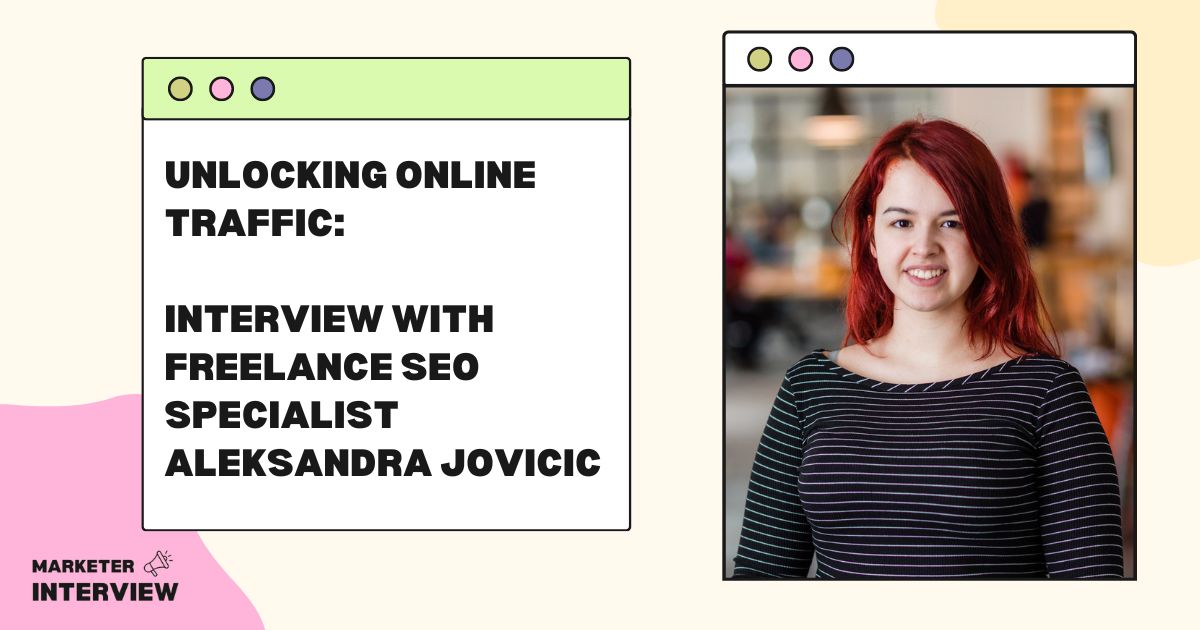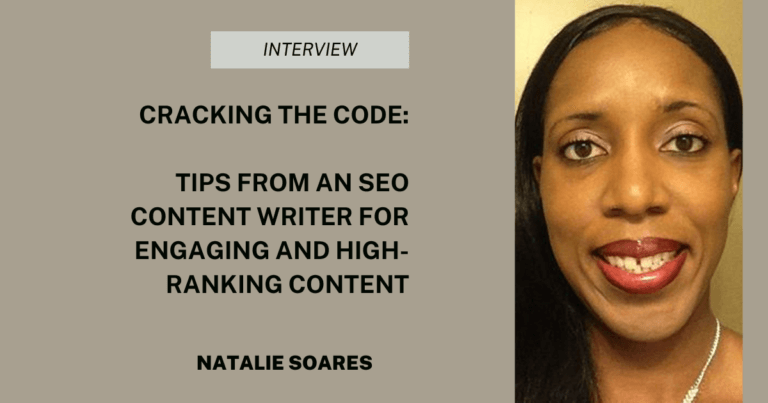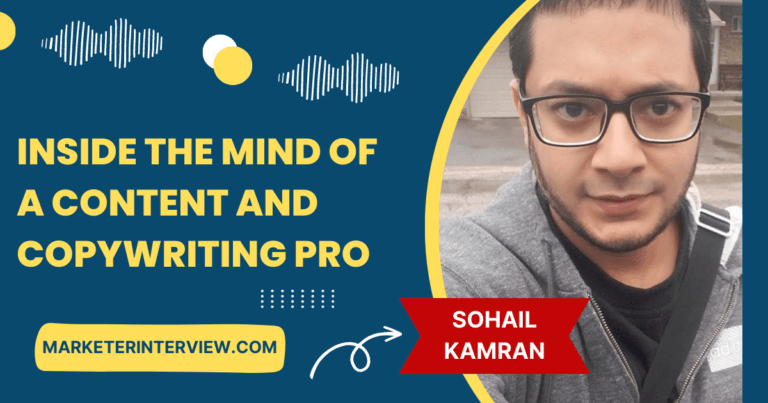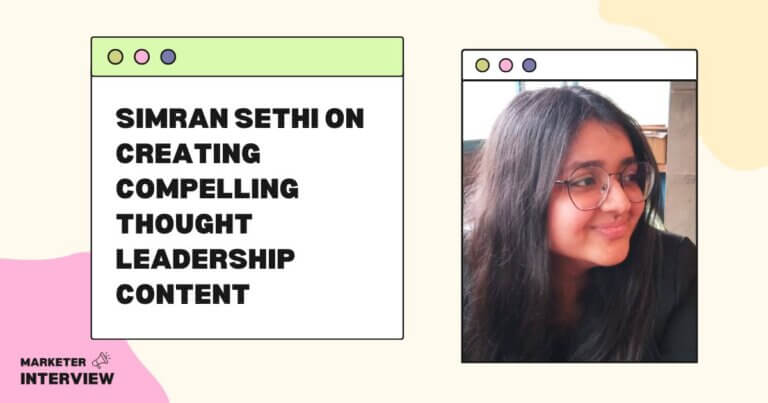Unlocking Online Traffic: Interview with SEO Specialist Aleksandra Jovicic
Welcome to Marketer Interview!
Today we have the pleasure of speaking with Aleksandra Jovicic, a freelance SEO specialist and content writer.
With a skill set that includes conducting website audits, keyword research, and link building, Aleksandra is an expert at helping businesses improve their online presence and drive more traffic to their websites.
In this interview, we’ll dive into her career journey and discuss tips and tricks for improving your SEO strategy.
Contents
- 1 How did you get started in the world of marketing and SEO?
- 2 What is your process for conducting a content audit?
- 3 How do you approach keyword research?
- 4 How do you balance writing for readers and optimizing for search engines in your content creation process?
- 5 How do you stay up-to-date with the latest SEO trends and algorithm changes?
- 6 What is the biggest mistake that businesses make when it comes to SEO?
- 7 What are some link-building techniques that are still effective in 2023?
- 8 What is a common mistake SEO consultants make?
- 9 What software or tools do you use regularly to execute your job?
- 10 What advice would you give someone just starting in SEO and digital marketing?
How did you get started in the world of marketing and SEO?
Six years ago, I was studying at a Mechanical Engineering University, which wasn’t going well, so I dropped out after my first year.
I needed a job as soon as possible and landed one as a receptionist at a coworking space. While working there, I met many people with different careers – remote workers, freelancers, and startup owners.
This experience opened my eyes regarding my career, and I started learning how to run social media channels for businesses.
A few months later, the coworking space I was working at needed a new Digital Marketing team member, so I applied and got the job. They gave me a mentor, and that’s how I started my marketing career.
That first role covered everything: SEO, content writing, community management, advertising, email marketing, etc.
This was an excellent base for my future career, and out of everything I did, I enjoyed working on SEO the most, so I chose it as a base for my career.
Over the next few years, I’ve done many different things, but SEO was always the base of everything.
What is your process for conducting a content audit?
The SEO consultant can do content audits for many different reasons. I’ve mostly worked with companies with a ranking issue (a lot of content that doesn’t bring very little traffic).
First step: Create a list of all the articles/pieces of content they published.
Note other important information like word count, the target keyword, content type, the stage of the customer’s journey, etc. I also look at metrics for each article, like rankings, organic traffic, number of backlinks, and conversions.
Once this list is made, I create a list of changes that need to be made and prioritize them based on business importance, keyword volume, and keyword difficulty.
These changes can range from a simple URL fix to completely rewriting the article to fit the search intent better.
How do you approach keyword research?
It all depends on the existing content on the website the client has.
When working with a new website, I’d want first to cover general topics in their niche.
Sometimes, the niche can be competitive. Therefore, I combine general topics with some not-so-popular topics with low keyword difficulty so the website can start ranking sooner.
For websites with quite some content, I focus on the content gap compared to their competitors and improving existing content that’s not ranking well.
Sometimes, a client has a lot of good content, but it wasn’t written to rank for a specific keyword. In this case, I look for new angles and keywords to optimize the content.
I mostly use Semrush, Ahrefs, and Answer the Public.
How do you balance writing for readers and optimizing for search engines in your content creation process?
I write in three phases, but the ultimate rule I follow is – the reader comes first, and search engines come second.
Phase 1:
I first examine the primary and secondary keywords when writing a new piece. Then, I look for relevant questions and subsections to target with the post and create an outline.
As I create an outline, I research the articles that already rank for that keyword. Then, I look at their outlines and the search intent behind each specific keyword. All of that helps me create an article structure.
Phase 2:
Writing! This task differs entirely from the previous one, so I combine these two phases to get into my creative zone.
I write in a conversational style, in a way that will be interesting and engaging to the reader, by including examples and real-life stories.
Phase 3:
Once the writing is done, I optimize the article according to the best on-page optimization practices.
This process helps me write an article for people and ensure it’s optimized for search engines.
How do you stay up-to-date with the latest SEO trends and algorithm changes?
I stay in touch with the latest SEO trends and algorithm changes by following industry leaders on LinkedIn, subscribing to relevant newsletters (like Steve Toth’s SEO Notebook), and engaging in online communities (like Superpath).
However, it’s becoming increasingly challenging for me to navigate the amount of news and updates I get.
Every week, there’s a new take on why SEO is dead or not dead, why links are more or less critical, and why content is dying or not dying.
My biggest challenge isn’t about where to find the latest trends. They’re everywhere. The biggest challenge is to figure out which ones are relevant for me, my clients, and their industries.
What is the biggest mistake that businesses make when it comes to SEO?
One of the biggest mistakes businesses and many SEOs make is focusing on quantity over quality. Unfortunately, that’s true for both content and link building.
I’ve seen many companies focus on publishing as much content as possible. A better approach would be to produce a few high-quality pieces that rank well for competitive keywords.
Regarding links, a few really great, white-hat links can have a more significant impact than hundreds of low-quality, spammy links.
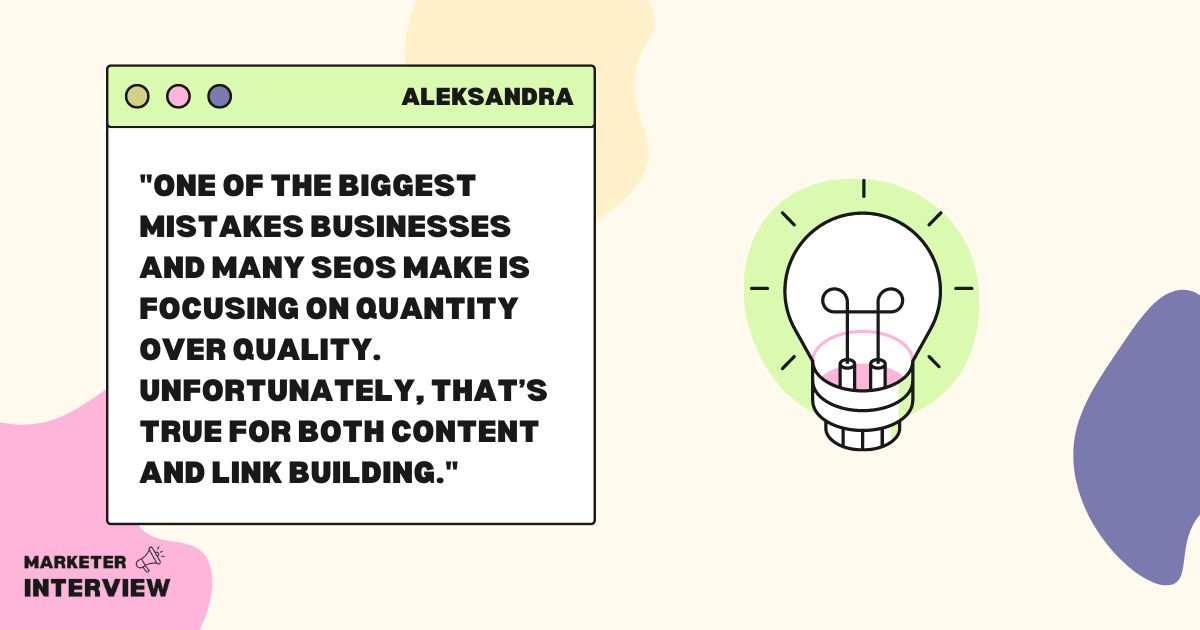
What are some link-building techniques that are still effective in 2023?
Three of my favorite link-building techniques that are still quite effective in 2023 are:
1/ Data-based industry reports:
If your business has access to unique data that you can pack into a helpful study/report, that’s your link goldmine.
Once you create this report, you can write a press release/content summary and distribute it to media, blogs, and companies in your industry.
2/ HARO and similar services:
HARO and similar services are growing in popularity. In addition, new platforms that connect sources with content creators are popping up every day!
They’re effective because they connect you with someone who needs content immediately. The chance of being featured is much higher by pitching them instead of doing cold outreach.
It’s important to mention that this has become quite competitive over the past two years.
3/ Contributing to other websites:
Guest blogging is still quite effective in 2023, but it needs to be reimagined!
You can build links by doing this, but not on the spammy websites that accept guest posts from everyone and sell links for $50.
One of my favorite guest blogging techniques is connecting my clients with other businesses in the industry that aren’t direct competitors and providing content for them.
It’s a win-win situation, the other company gets a free article, and you get a link and a chance to get some promotion right in front of your ideal user base.
What is a common mistake SEO consultants make?
A common mistake I’ve seen among SEO consultants is purchasing and exchanging links with websites that seem spammy. The reason why this is an issue is that:
Purchasing links is against Google’s guidelines, and you’re risking a lot. If you get penalized by Google, you’ll have to spend a lot of time and resources to retrieve your rankings and lift the penalty.
If a website sells links to you, they do the same for many other websites, including some very sketchy ones.
If the websites you’re getting links from get penalized, you’ll lose many of your backlinks, harming your rankings and authority.
The same goes for exchanging.
You can fix this by educating yourself and your team on white-hat link-building strategies and then hiring someone who meets your quality standards when it comes to link-building.
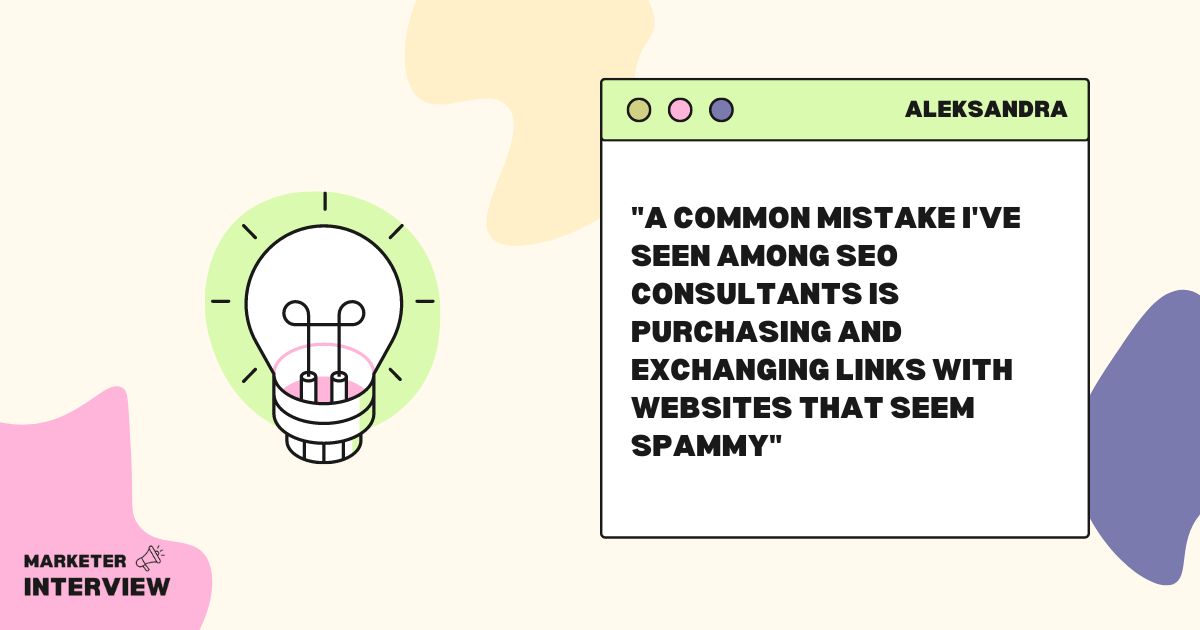
What software or tools do you use regularly to execute your job?
Basecamp: for organizing my projects, tasks, and documentation.
Slack: for online communities and communication.
Zoom and email: for client communication.
Ahrefs, SEMrush: for keyword research, backlink analysis, and other SEO tasks.
Terkel, HARO, Help a B2B Writer: for link building
Answer the Public – for keyword ideation.
What advice would you give someone just starting in SEO and digital marketing?
You don’t have to choose a niche or an area of digital marketing right away.
Instead, you can keep experimenting and exploring different fields until you find something you like the most. And even if you don’t find one specific area/niche that’s your favorite, you can combine multiple ones into a unique skill set.
